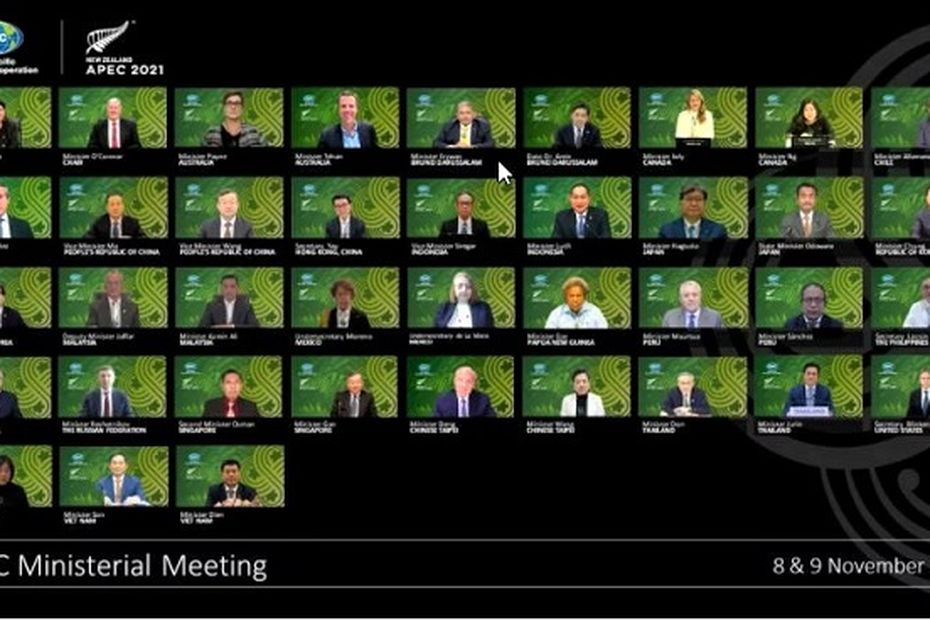Leaders from 21 countries of the Asia-Pacific Economic Cooperation (APEC) Forum will participate in a virtual summit hosted by New Zealand. The Chinese and American presidents will speak there. Even from a distance, regional tensions will no doubt be perceptible.
•
Free trade and open economies will drive the recovery of the Asia-Pacific region from the pandemic, the region’s trade and foreign ministers said on Wednesday at a virtual meeting ahead of the summit. Asia-Pacific Economic Cooperation Forum (APEC). It takes place in the next few days since the Aotea Center in Auckland.
This Forum is an opportunity for New Zealand to emerge as a pioneer in digital diplomacy. The Forum involves hundreds of virtual meetings and events with 21 economies in 11 time zones.
A fully virtual APEC Forum
•
–
Regional economies
“It is free trade, fair and open, that will help economies emerge from this pandemic”, said New Zealand Trade Minister Damien O’Connor, host of the meeting. “We need openness to stimulate global growth, it is indeed trade that presents the solution to our challenges”, he added.
On Wednesday, the ministers concerned from the 21 APEC countries met for a video conference. On Saturday, a summit meeting, also virtual, will bring together heads of state. US President Joe Biden and his Chinese counterpart Xi Jinping will speak.
Mr O’Connor said the main points of the discussion included a plan to voluntarily freeze fossil fuel subsidies and commitments to ease tariffs on vaccines and other medical supplies in the event of a pandemic.
The need not to erect trade barriers, in response to the challenges posed by the pandemic, had a consensus among the ministers gathered, according to Mr. O’Connor.
“Some 81 million jobs have been lost in the region due to Covid-19 and the impact on supply chains has been significant, but APEC members have rejected protectionism during this crisis.”, he continued.
The 21 APEC member economies collectively represent nearly 40% of the world’s population and about 60% of global GDP. A previous unprecedented virtual meeting brought together APEC leaders in July with the aim of improving the response of countries in the region to the Covid-19 pandemic.
Fossil fuels
New Zealand Foreign Minister Nanaia Mahuta said on Wednesday that Apec members had agreed to send a strong message on stopping any increase in fossil fuel subsidies.
“These subsidies cost our savings billions of dollars a year, but the real impact is being felt on our environment.”, she said.
The APEC summit was originally scheduled to be held in Auckland, but it is being held online for the second time due to Covid-19. New Zealand Prime Minister Jacinda Ardern said the digital platform was easier to access than a face-to-face event.
On the agenda for Saturday’s discussions: how to reopen borders without spreading the virus, how to ensure a fair recovery in the event of a pandemic and how to move towards a carbon-free economy.
Regional tensions
The debate on the sidelines of the summit will be dominated by the candidacies of China and Taiwan to join the Comprehensive and Progressive Trans-Pacific Partnership (CPTPP), which is the largest free trade pact in the region, between 11 countries: Australia , Brunei, Canada, Chile, Japan, Malaysia, Mexico, New Zealand, Peru, Singapore and Vietnam.
China, which sees the island as part of its territory, is opposed to Taiwan joining, while Australia does not want China to be part of the group, due to a lingering trade dispute.
The United States, through President Jo Biden, will also want to use the event to reaffirm its commitment to trade in the Indo-Pacific region after years of protectionist policies under the administration of Donald Trump.
President of the People’s Republic of China Xi Jinping will address the APEC summit on Thursday, November 11 and Friday, November 12.
–


